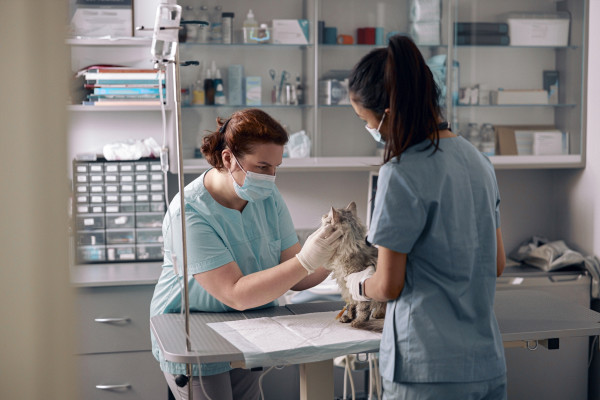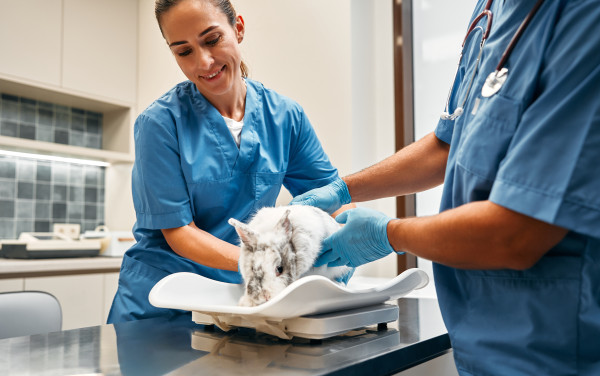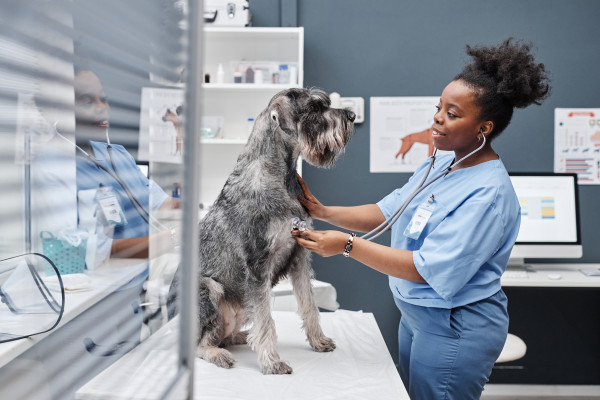
Beyond the Clinic: How Licensed Veterinary Technicians Are Shaping the Future of Animal Care
Each October, we celebrate National Veterinary Technician Week, a well-deserved opportunity to recognize the skilled, compassionate professionals who form the backbone of veterinary medicine.
But as the pet care industry continues to evolve, so too does the role of the veterinary technician. Far beyond assisting in the exam room, today’s credentialed technicians are educators, consultants, researchers, and innovators whose expertise reaches into product development, nutrition, and beyond.
A Foundation Built on Science and Medicine
Becoming a licensed veterinary technician or technologist requires formal education and hands-on training. These professionals carry the credential Licensed Veterinary Technologist (LVT), Certified Veterinary Technologist (CVT), or Registered Veterinary Technologist (RVT), which vary by state but mean the same thing. Graduates of AVMA-accredited programs complete coursework and clinical rotations that mirror many aspects of veterinary medical training, from anatomy and pharmacology to surgical nursing and diagnostic imaging.
Areas of education include:
- Anesthesia and Analgesia: Understanding species-specific responses to anesthesia, managing pain safely, and monitoring vital signs.
- Clinical Pathology: Performing lab diagnostics, interpreting results, and recognizing abnormalities critical for treatment decisions.
- Nutrition: Assessing body condition scores, identifying dietary imbalances, and creating nutritional support plans.
- Pharmacology: Dosing, administration routes, and potential drug interactions across multiple species.
- Behavior and Handling: Reading subtle body language cues to reduce fear and stress, improving animal welfare and safety.
- Emergency & Critical Care: Managing triage, fluid therapy, and life-saving interventions under pressure.

Photo by friends_stock
Research and Academia: The Scientific Stewards
In research and academic settings, licensed veterinary technicians and technologists bring precision, ethical oversight, and scientific rigor. They assist in study design, collect biological samples, manage animal welfare in research colonies, and ensure compliance with Institutional Animal Care and Use Committee (IACUC) and Association for Assessment and Accreditation of Laboratory Animal Care International (AAALAC) standards.
In academia, vet techs shape the next generation of professionals as instructors, lab coordinators, and curriculum developers, blending clinical experience with educational strategy.
Pet Food and Nutrition: The Translators Between Science and Real Life
Nutrition is a cornerstone of preventive health, and vet techs are uniquely positioned to interpret and apply it. Their education includes studying animal nutrition, metabolism, and physiology.
- Formulation input: Advising research and development teams on ingredient functionality, palatability, and bioavailability.
- Technical support: Helping veterinary and retail partners understand product use, feeding trials, and label claims.
- Quality assurance: Assisting with nutrient analysis, testing protocols, and compliance with Association of American Feed Control Officials (AAFCO) or National Animal Supplement Council (NASC) guidelines.
- Education and communication: Creating accessible, evidence-based educational materials for veterinarians and pet parents.

Photo by ORION_production
Industry and Consulting: Applying Clinical Insight to Innovation
More veterinary technicians are finding their voice as consultants and advisors within the corporate and veterinary industries. Their expertise enhances product credibility, client trust, and scientific accuracy.
- Evaluating new technologies or therapies with a clinician’s perspective on usability, efficacy, and safety.
- Supporting regulatory and compliance work for supplements, biologics, and regenerative therapies.
- Training sales and field teams to communicate scientifically accurate information with empathy and confidence.
- Collaborating with veterinarians, nutritionists, and formulators to translate medical insights into consumer-facing strategies.
Education, Communication, and Client Support: Advocates and Educators
Vet techs are often the most approachable and trusted educators for both clients and colleagues. In today’s digital era, many have expanded their reach through telehealth platforms, continuing education (CE) program development, brand education, and pet parent engagement.
Their communication skills, grounded in empathy and backed by science, make them powerful advocates for evidence-based care.

Photo by seventyfourimages
Supporting and Elevating the Profession
As veterinary technicians take on more diverse roles across animal care, research, and industry, empowering their professional growth and wellbeing is vital to the future of veterinary medicine. Veterinary institutions and industry partners can lead this charge by:
- Encouraging career diversification: Create clear pathways for veterinary technicians to explore consulting, product development, or educational roles.
- Investing in continuing education: Support advanced certifications and leadership training.
- Valuing professional credentials: Recognize LVTs, RVTs, and CVTs as credentialed medical professionals (nurses), not ancillary support staff.
- Including vet techs in decision-making: Their insights can guide everything from patient care protocols to product development and industry standards.
A Final Word
Veterinary technicians are more than the heart of the clinic; they are scientists, strategists, educators, and advocates whose reach now spans every corner of the animal health industry.
This National Veterinary Technician Week, let’s celebrate the depth of their education, the breadth of their skill sets, and the limitless ways their expertise continues to elevate animal health, nutrition, and wellbeing, from the exam room to the boardroom.
Follow us on LinkedIn for the latest updates on all things happening here at BSM Partners.
About the Author
Lee Ann Hagerty is Director of Customer Enrichment and Consumer Insights on the BSM Product Innovation team with 29+ years in the pet food industry, working for Iams/Eukanuba, Procter & Gamble, and Mars Pet Care. She brings a unique combination of project management skills with consumer insights, product design, animal nutrition, and sensory science which drives an in-depth understanding of the pet and consumer. Lee Ann has a passion for helping dogs. Over the last year and a half, she has fostered over 22 dogs. Many of them were senior dogs who had lived their entire lives outside as hunting dogs. She has been a foster pet parent for many years, and it brings her great joy to see these pets find fur-ever homes where they live with families indoors with love and care.
This content is the property of BSM Partners. Reproduction or retransmission or repurposing of any portion of this content is expressly prohibited without the approval of BSM Partners and is governed by the terms and conditions explained here.